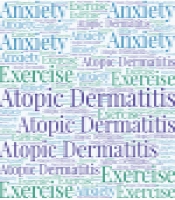Dear Editor,
I am a patient born with atopic dermatitis (AD), and I would like to discuss whether exercise is good for patients with AD. The majority of the patients with AD do not like doing exercises - particularly outdoor sports, mainly due to the fact that sweating often aggravates their condition. This, in turn, causes them to stay indoors and avoid exercising altogether. Regarding this issue, however, I have a different experience, and I would like to share it with the readers.
Just like most patients with AD, I didn’t like sports before going to college because I always developed rashes and itching and felt terribly uncomfortable after doing exercise. As a result, I developed an inclination to avoid exercising altogether when I had to do it. According to the related studies, a patient with AD feels uncomfortable after exercising due to the following main reason: The discharged sweat may induce mast cells to secrete histamine and raise body core temperature in an AD patient, which often leads to cholinergic urticaria (CholU) (1). Therefore, an AD patient’s condition often deteriorates after doing sports, which may reduce his/her willingness to exercise.
After going to the college, however, I began to realize that proper exercise may have proved beneficial and helped me control my skin condition due to the following reasons. The first reason concerned the emotional aspect. As we all know, positive emotions are very important for AD patients to control their skin condition. Furthermore, previous research results have shown that anxiety can worsen the condition of patients with AD because it may trigger Th2-type responses, which, in turn, may lead to allergic symptoms (2). Therefore, my itching severity often reduced when I felt calm after exercising. Sometimes, my skin condition even improved completely. The second reason was associated with the moisture of the skin and the itching feeling, so my skin remained oily and moist for a few days after the exercise.
To help control my skin disease, however, I still had to do certain relevant supporting activities. For example, it was absolutely necessary for me to wash off the sweat after doing exercise and avoid direct exposure to the sun. While exercising helped me keep my skin healthy and fresh, I still felt itchy and even scratched my body when I failed to treat my skin after sweating during the day. A prolonged exposure to the sun also left me uncomfortable. Therefore, I found it necessary for AD patients to avoid activities or things leading to frustration after exercising.
Some Taiwanese associations have recently developed sports activities and programs (e.g., running, cycling, etc.) for patients with AD (3). It is argued that doing exercise may prove useful for AD patients and that sometimes it may even help them control their health conditions.
Given the above discussion, doing exercise may have improved the skin condition of the patients with AD under favorable circumstances, although most people found sweating a problematic bodily function for these patients. Therefore, it was recommended that more patients should do regular exercises suitable for them in order to likely facilitate controlling the disease.
